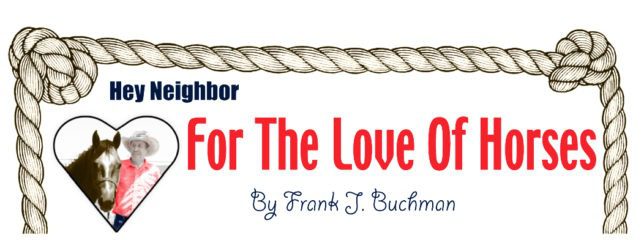Horses certainly have their value on a ranch, there was no denying that, but when it came to putting money out to buy one, Fred Germann pinched it twice before letting lose, and had second thoughts at that.
We might be a bit dramatic in our evaluation, but Germann expressed his philosophies publicly about costs of horses to us more than once.
While some wouldn’t initially think of him as a cowboy, there was no question of Fred Germann’s abilities as a stockman. His diverse operations, including large numbers of
cattle from cows with calves to back grounding to occasionally finishing cattle, certainly qualified him as a cattleman.
With large native grassland acreages under his ownership and personally-owned cattle grazing those Flint Hills, Germann fit the definition of rancher appropriately as well.
Thus, there was not a second consideration of qualification on September 11, when Fred Germann of Dwight was inducted into the Kansas Cowboy Hall of Fame at Dodge City in the rancher-cattleman category.
In an effort to honor some of the cowboys who have been around a while and made a mark in their industry, Boot Hill Museum created the Kansas Cowboy Hall of Fame in 2002 and inducted a single cattleman.
Eight years later, a crowd of about 60 people gathered under a big tent to celebrate the five 2010 Hall of Fame inductees. Fred Germann was unable to attend for health reasons, but his sister, Rosalie Thompson, spoke on his behalf. Germann passed away at Junction City on September 17.
Almost always, a horse or two was in Fred’s pasture ready for use in gathering and working cattle, but they didn’t get as much employment in recent years.
Still, Germann could recite many stories about horses he’d owned, and how his family had converted from horse power to tractors in the first one-third of the past century.
Perhaps Fred’s conservative outlook on dollar values of horses, and not always the most enthusiastic review of their worth, was somewhat of a reflection on a bad experience in the early ’40s. At the age of 18, Germann enrolled at the Kansas State Agricultural College and received a draft deferment as a farmer during World War II.
However, his college graduation was delayed by several years due to a horseback riding injury. We never heard or can’t remember any more details of that situation, but we insinuate that might have deteriorated his fondness for horses which other
ranchers often have.
Born March 3, 1921, at home in theBlue River Valleynorth of Manhattan, the son of G.F. and Blanche Clark Germann, Fred attended the one-room Blue Valley country school, then graduated from Stockdale High School in 1939, where he was active in sports.
At K-State, Germann became an outstanding livestock judge under the tutelage of Dr. Don Good. He was a member of the Farm House fraternity and graduated from K-State with a degree in animal husbandry.
After graduation, Fred returned to his family’s river bottom farm Unfortunately, the federal government planned to build a dam on the river for flood control, which would take many acres of farmland and rural communities.
Fred’s biggest challenge was participating with his neighbors in opposing the construction of Tuttle Creek Dam, but they lost the “Battle of the Blue”, as it was called.
The Corps of Engineers bought the fertile Germann land but not the adjacent pastures. Some of those Flint Hills were developed into building sites extending along the shore of Tuttle Creek Lake.
“If someone hands you a lemon, squeeze it and start a lemonade stand,” Fred is said
to have quoted. In 1957, Germann moved with his parents to Humboldt Creek in Geary County, southeast of Junction City, and eventually acquired 3,500 acres.
Though known mainly as a cattleman, Germann raised hogs using a then-new technology, specific-pathogen-free pork, which kept hogs in conditions that minimized disease and improved herd health. He sold SPF hogs for breeding purposes throughout America and internationally.
Germann also partnered with several local businessmen to form F & R Swine, Inc., an intensive pork producing confinement facility that he served as president until 1987. Fred retired from the hog business in 1996 and expanded his cattle business and extensive farming acreage.
Fred Germann is the only person to have served as president of both the Kansas
Livestock Association and the Kansas Pork Producers Council.
“Fred’s involvement in livestock organizations was characterized by a modest, friendly, common-sense demeanor that reflected sound judgment and progressive leadership,”said KLA Executive Vice President Dee Likes. “Men like Fred are who made the livestock industry great.”
In 1959, Germann married Helen Van Buskirk at the Methodis tChurch, Howard, Kansas. They have two daughters, Debra Taylor, Manhattan, and Lisa Williams, Junction City, and three grandchildren: Tyler Williams, Deja and Jonathan Taylor and a son-in-law Johnny Taylor.
Germann was a member of the First Presbyterian Church, Junction City, where he served as an elder, deacon and taught Sunday school.
Fred was involved in many community activities, serving on boards and committees and was one of the original board members of the First State Bank in Junction City and served for many years.
He and Helen were recognized as Kansas Master Farmer/Master Homemaker in 1974. The couple traveled extensively for pleasure and for business throughout the United Statesand overseas.
Germann was honored as Stockman of the year in 1989 by the Kansas Livestock and Meat Industry Council.
In 2003, Fred wrote a book, “Recollections…My Life Story.” Germann was the recipient of many honors and awards, but he was most proud of helping young people get started in agriculture.
He said, “My greatest pleasure is helping the next generation begin an agriculture career and then watch them succeed on their own.”
Whether his fondness for horses was as great as that of some, Fred Germann was a rancher-stockman, leader for all of agriculture, and his lifetime of service is forever recognized as a cowboy with his induction into Dodge City’s Hall of Fame.
+++
